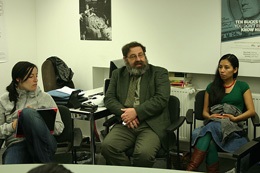
The topic of this year’s ECLA Annual Conference was social entrepreneurship – a term quite recently adopted by both the business and academic worlds. Through their involvement, the students explored approaches to resolving social issues and forming a self-sustainable business plan. In more general terms, it helped students understand how to put theory into practice. The structure of the week provided the theoretical background as well as the challenge of working in teams and competing against each other in developing social entrepreneurship projects.
The morning guest speakers provided the framework by defining social entrepreneurship in terms of business, academia and society. The first two guest speakers Christian Seelos (lecturer and senior researcher at IESE Business School) and Nir Tsuk (Director of Global Fellowships, Ashoka) clarified the concept of social entrepreneurship networking, while Krzysztof Stanowski (Ashoka fellow) discussed the practical aspects of being a social entrepreneur in Eastern Europe and Central Asia. The week ended with the lectures by Adam Davis (Philosopher, University of Chicago) and Paola Grenier (Sociologist, London School of Economics). The speakers also offered in-depth answers to the students’ questions in afternoon seminars, explaining their vision of social entrepreneurship and sharing their experiences in the branch.
Working on student projects was done in the afternoons, in specialised seminars with ECLA professors and continued long into the night in the dorms. Student teams discussed the projects during seminars using different perspectives including aesthetics, ethics, business and public relations. Evenings were the time to meet with the team or undertake personal research. At the end of the week, during a joint session, all teams made presentations of their projects, which included the social issues they sought to resolve and their social entrepreneurial strategy. The €500 prize provided support for the implementation of the project and was awarded to the team of ‘Youth Radio’.
ECLA instructor Catherine Toal, who co-organized the event, mentions how the 2007 edition of the Annual Conference was innovative. In contrast to the topics chosen in previous years, social entrepreneurship is “something that could not be treated solely in academic terms”. The effort was “to bring together the education that takes place at ECLA with a practical endeavour and to reflect on both” explains Toal. The field is certainly a career option for those with a humanities education, which is one reason why ECLA also hopes to integrate this week’s experience into next year’s curriculum in the form of a book project and research methods seminar.
ECLA students also appreciated the opportunity to develop projects. Anca Rujoiu (Academy Year 2007, Romania) explained: “I found it difficult to create this project, because it was a break with everything we did here; however, the practical aspects gave me an image of what social entrepreneurship is or should be”. Eka Imerlishvilli (Academy Year 2007, Georgia) spoke about the authenticity of the approach: “Working on our own projects was better than having a strictly theoretical approach, since the projects had real chances of being implemented. It made the Annual Conference not only interesting, but also extremely realistic”. “Film footage of lectures, seminars and final presentations will be available in two weeks time on ECLA’s website as well as on the Annual Conference webpage. The end of the year celebration at ECLA will probably feature a community screening as well” announced Jeff Marshall (Academy Year 2007, USA).
The week allowed us to reflect on the role liberal arts can play in confronting social realities. We learnt that where NGOs or governments fail, personal involvement and generosity can make a great difference. However, social change requires systematic and well-planned joint efforts. Moreover, we saw how understanding social phenomena is only the first step to resolving a problem, action must follow. We also realised that profit can be measured in terms of impact and social benefit rather than just financial gain. It is said that ‘where there’s a will, there’s a way’ and, hopefully, many of us will keep this in mind after graduation.
By Clara Sigheti (2007, Romania)
